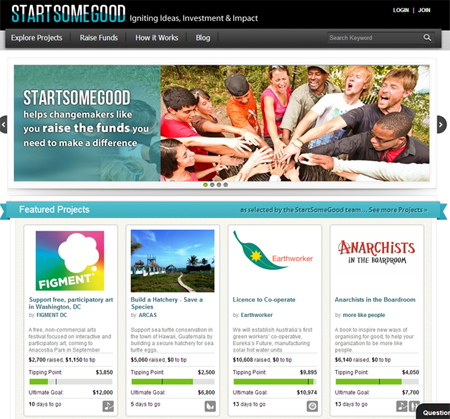I posted a more personal, reflective announcement about the new version of StartSomeGood.com here last week but for those of you know don't subscribe to the StartSomeGood weekly email (and you really should if that's the case, see bottom-right of the homepage) I wanted to also share with you the email we sent to the 10,000 members of the site on Friday:

Hi everyone,
In place of our usual newsletter we wanted to send you a personal email this week to let you know about some exciting changes happening at StartSomeGood and reflect on where we are.
Most importantly and obviously we have just unveiled the new version of our site!
The new site is a big step forward for us and we hope you like it as much as we do. The major changes include a lighter, brighter and friendlier design, with a simplified navigation which gives greater prominence to success stories and information to help you succeed at crowdfunding. On the back-end there’s an upgraded project dashboard to help you launch and manage your campaigns and we’re adding alternatives to Paypal for donors (already available to US ventures, coming soon for everyone else).
But it’s not all about technology. We remain committed to a hands-on and partnership-driven approach which provides you with the advice and support you need to succeed.
So if you have an idea for a project which can improve the future of your community, why not start today? Register on our site and a member of our team will be in touch to help you design a campaign which will succeed.
Over the past two years, with your support, we have built a vibrant community of changemakers at StartSomeGood. Together, we have successfully funded 125 world-changing projects in 23 countries. We have supported social entrepreneurs as young as 16 and as established as Ashoka Fellows. We have helped launched projects as diverse as open-source mapping in Nepal to Sock Monkeys who fight cancer in the US, from social enterprise cafés in Cambodia to supporting young families in Australia and inspiring youth volunteering in 22 cities across America.
While we are proud of these successes there’s so much further we want to go. Our goal is to launch 1,000 new social initiatives over the next two years, transforming millions of lives around the world.
We would love your project, your idea, your community, to be part of that. Without you, we’re just a boring old website. With you, we can be an epic force for good in the world.
So don’t wait any longer. If you have the drive and the passion to make a difference we want to help.
Together, let’s start some good!
Sincerely,
Tom and Alex
Co-founders, StartSomeGood
PS. Read about the details of the new site and all the great activities we’re doing to celebrate, including a riddle hidden in the website and daily twitter chats this week on our blog.
PPS. Speaking about getting started you may be inspired by the first episode of our new podcast series Starting Good, featuring Charles Best, founder of DonorsChoose. Check it out.
 Bill Drayton, founder of
Bill Drayton, founder of